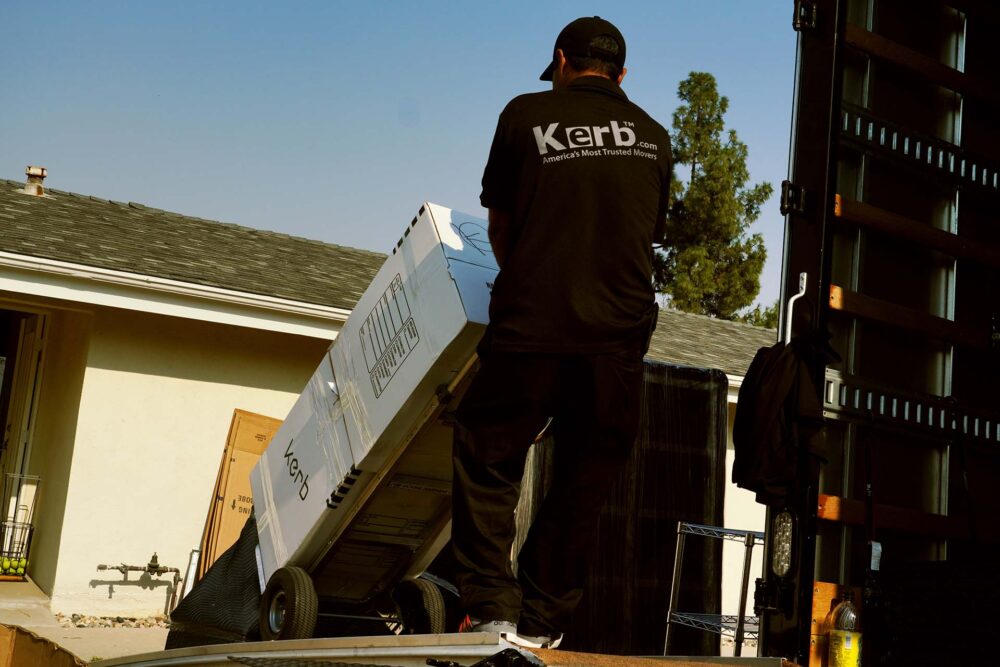Embarking on the journey of relocation, many of us grapple with the lingering question – is moving traumatic? The emotional turbulence associated with leaving the familiar behind and venturing into uncharted territory is a universal experience. Here’s all you need to know about the psychology of relocating.

Is Moving Traumatic?
Cross-country moving can be a profoundly emotional experience, often entailing stress, anxiety, and a sense of loss. The psychological effects of leaving a familiar place, whether for adults or kids, can contribute to the perception of relocating as traumatic.
While some view long-distance moving as an opportunity for growth, others find the experience genuinely negative and stressful. That’s why there are many things to consider when relocating. Just consider that Americans move around 12 times. Now imagine going through the same traumatic process that many times. That way, you should unravel the complexities and nuances surrounding the entire process and understand the real and perceived aspects of relocation trauma.
Understand the Psychology of Moving and Emotional Turbulence
The psychological effects reverberate through the core of our beings as we grapple with the intricacies of bidding farewell to the familiar. Leaving friends and a place we’ve called home introduces a cascade of emotions, ranging from nostalgia to apprehension. The sense of loss and grief that accompanies departing from a well-known environment is a poignant aspect of this emotional journey.
The places we leave behind become repositories of memories, and parting ways can evoke deep-seated sorrow. In exploring the psychological landscape of change and transition, we unearth the complex interplay of emotions that characterize the human response to the dynamic process of relocating.
Stress and Anxiety in Relocation – How to Deal With Them?
Navigating the intricate web of relocation anxiety and stress requires a nuanced understanding of the factors that contribute to this emotional turbulence. From the meticulous task of booking white glove moving service and packing cherished belongings to the organizational challenges inherent in any move, the stress factors can feel overwhelming. Additionally, the fear of the unknown, often rooted in uncertainties about the new environment, can amplify these anxieties.
However, amidst the chaos, practical strategies exist to manage moving-related anxiety. Crafting a detailed relocation plan, breaking tasks into manageable steps with a comprehensive checklist, and seeking support from friends or booking professional white glove moving services can alleviate the burdens of packing and organizing.
Embracing mindfulness techniques, such as deep breathing or meditation, can also provide a mental anchor amid the uncertainties, fostering a sense of calm and control. Try to address these stress factors head-on, and you could cultivate resilience in the face of change, transforming the process into a more manageable and less anxiety-inducing experience.

Is Moving Trauma a Real Thing or Exaggerated?
Analyzing the traumatic potential of relocating unveils a complex interplay of emotions that individuals grapple with during this significant life transition. The question of whether a move can lead to trauma is a nuanced one, as the experience varies widely among individuals. While some navigate the process smoothly, others encounter profound emotional challenges, viewing their relocation as a potentially traumatic event.
Expert opinions and psychological insights shed light on the multifaceted nature of relocation trauma. Some argue that the cumulative stressors associated with packing, uprooting, and adjusting to a new environment, especially when relocating alone, can indeed trigger trauma-like responses in vulnerable individuals.
Psychologists emphasize the importance of acknowledging the emotional toll of relocating, recognizing that the sense of loss, upended routines, and unfamiliar surroundings can impact mental well-being. By integrating these expert perspectives, we can better understand the spectrum of responses to relocating and the potential for it to be genuinely traumatic for some individuals.
Is Moving Traumatic for Adults?
The emotional impact of moving on adults transcends the logistical challenges and extends into the realm of emotional well-being. For many adults, the process of leaving behind a familiar place, be it a longtime residence or a cherished community, can evoke a profound sense of loss and upheaval. There are many reasons for relocating, but career shifts, social adjustments, and the dismantling of established routines contribute to the stressors.
Nevertheless, the response to relocation is highly individual, with some adults embracing change as an opportunity for growth while others grapple with the emotional complexities that arise during the transition.
Is Moving Traumatic for Kids?
Relocating with kids is a delicate matter that involves navigating the complexities of adapting to new surroundings. For kids, the emotional upheaval associated with relocation can be particularly challenging, disrupting familiar routines, friendships, and educational environments. The potential for a move to be traumatic for children is heightened by the need to adjust to an unfamiliar social landscape.
However, children also exhibit remarkable resilience, and the support provided by parents, educators, and a nurturing community plays a crucial role in easing the transition. Engaging kids in the relocation process, addressing their concerns openly, and emphasizing the positive aspects of the change can contribute to a smoother adjustment.

Coping Mechanisms and Emotional Well-Being
Practical tips can significantly ease the process of coping with moving. Start managing moving stress with meticulous planning. Create a to-do list to break down tasks into manageable steps, from packing fragile and other stuff to settling in the new space.
Seek support from friends and family and book professional cross-country movers and packing services to alleviate the burden. Staying organized is key – label boxes clearly, prioritize your essentials, and maintain a sense of order amidst the chaos. Equally important is prioritizing mental health during a move. Incorporate regular breaks, practice mindfulness techniques, and recognize the validity of your emotions.
Practical Tips for Managing Stress
Effective stress management techniques are essential when facing the myriad challenges of a move. Practical tips for managing stress encompass a holistic approach to ensure a smoother transition. Begin with meticulous planning, outlining a detailed timeline, and organizing tasks by priority.
Staying organized during the packing process can minimize relocation stress with clear labeling and strategic packing. This is where the reputable and experienced relocation crew steps in. Booking a professional relocation company like Kerb Movers will give you much-needed peace of mind.
To maintain mental health during a move, prioritize self-care, take breaks, and engage in activities that bring comfort and joy. Recognize that relocating is a process, and patience is key to navigating the inevitable stressors. These practical tips not only streamline the logistics of relocation but also contribute to a more positive and emotionally resilient experience.
Storage Services
Are you looking for storage services in your area? Kerb offers some of the best storage facilities in the country!
Auto Shipping
Are you looking for the best auto shipping company near you? Give Kerb a call, ask for a free quote and book our top-notch car transportation services.
Packing Services
When the time comes for us to relocate, we seek to find any possible help that will ease the whole process.
Building Resilience Through Transition
Adapting to new environments is a pivotal aspect of building resilience in transition. As individuals embark on the journey of transition, it’s essential to embrace change positively. Practical steps to adapt to new environments include exploring the local community, engaging in social activities, and immersing oneself in the cultural fabric of the area.
Building a support system in the new community is equally crucial. Establish connections with neighbors, join local clubs or organizations, and participate in community events. Encouraging a proactive approach to creating a new social network fosters a sense of belonging. By cultivating resilience through community engagement and a positive mindset, individuals can transform the challenges of relocation into opportunities for personal growth and enriching experiences.

The Aftermath of Relocating – Take Care of Yourself After the Relocation
As the whirlwind of relocation settles, the aftermath presents a crucial phase of emotional adjustment. The transition from the familiar to the unfamiliar necessitates a thoughtful approach to settling in. Besides unpacking after relocating, acclimatizing to the new environment requires a deliberate effort to immerse oneself in the local culture, explore nearby amenities, and forge connections with neighbors.
This period of emotional post-move adjustment is a journey toward creating a sense of home in the unfamiliar. Additionally, recognizing the importance of establishing new routines becomes a linchpin for stability in the midst of change. These routines act as anchors, providing a comforting structure amidst the novelty, and contribute significantly to the overall well-being of individuals in their new surroundings.
Settling In – Emotional Adjustment Post-Move
Settling into a new environment encompasses a nuanced process of emotional adjustment. As we mentioned earlier, tips for acclimating to the new environment include exploring the neighborhood, trying local activities, and connecting with community events.
Engaging with neighbors and becoming familiar with the local culture facilitates a smoother transition. Recognizing that emotional adjustment takes time and allowing oneself the grace to adapt at a personal pace are vital aspects of the post-move settling-in process.
When to Seek Professional Help for Moving Trauma?
Recognizing when to seek professional help during the aftermath of relocating is paramount for mental well-being. Signs indicating the need for professional assistance may include persistent feelings of depression, anxiety, or an inability to cope with the emotional challenges of relocation. If these signs persist or intensify, it is advisable to consider seeking the expertise of mental health professionals.
There is an abundance of resources for mental health support related to relocating, from local therapists and counselors to online platforms offering virtual support. Acknowledging the need for professional assistance is a proactive step towards prioritizing mental health, ensuring that individuals receive the necessary support and guidance to navigate the complexities of the post-move period successfully.

Can a Professional White Glove Moving Company Make Relocation Less Traumatic?
The expertise of professional long-distance movers can significantly mitigate the emotional toll of relocation, making the entire process less traumatic. Professional movers, often known for their “white glove” approach, specialize in providing a tailored and meticulous service that goes beyond merely transporting belongings.
Their attention to detail and personalized care addresses the unique needs and concerns of individuals and families. By entrusting the logistics of packing, organizing, and transporting possessions to skilled professionals, individuals can alleviate the burdens that contribute to relocation stress and anxiety.

Transformative Assistance from Kerb Movers – Navigating Relocation With Expertise and Empathy
In the intricate journey of relocation, we’ve unraveled the emotional complexities, stress factors, and potential trauma associated with moving. As you navigate this transformative process, consider the transformative assistance of Kerb Movers. Our white-glove approach not only eases logistical burdens but also contributes to a positive relocation experience. Contact us and embrace the journey with Kerb Movers, turning the pages of change into a new chapter filled with possibilities. Your stress-free move awaits where expertise meets empathy.
Can Moving to a New House Cause PTSD?
While uncommon, certain aspects of relocation can trigger PTSD-like symptoms in some individuals.
How Long Does It Take To Emotionally Adjust After Relocating?
The adjustment period varies and is influenced by factors like personal resilience, support systems, and the extent of change.
What Are Common Emotional Responses to Relocating?
Emotions such as stress, excitement, sadness, and anxiety are common during the entire process of relocating.
How Can I Make Moving Less Stressful for My Family?
Involve family members in the relocation process, maintain open communication, and consider hiring professional services for a smoother transition.
Are There Any Positive Psychological Effects of Moving?
Relocating can foster personal growth, present new opportunities, and bring the excitement of a fresh start.







